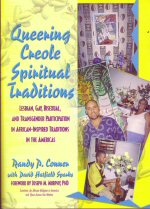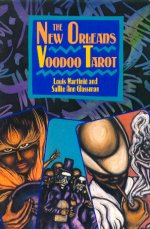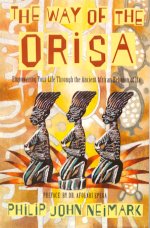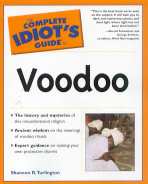


General
S. Jason Black & Christopher S. Hyatt, Ph.D. Urban Voodoo:
A Beginner's Guide to Afro-Carribean Magic. Tempe: New Falcon Publishing,
1995.
ISBN 1-56184-059-9
![]()
![]()
I have mixed feelings about this book. On the one hand, I feel like the authors spend too much time on self-congratulation and slagging the groups that they don't like (such as Christians and Wiccans). It also feels to me like they're describing ceremonial magick more than they're describing Vodou. Dancing, drumming, and singing get no real discussion in the book, for example.
On the other hand, I think that their discussions about power and about the inherent disempowerment of some religious belief systems is worth reading.

Karen McCarthy Brown, Mama Lola: A Vodou Priestess in Brooklyn.
Berkeley, University of California Press, 1991.
ISBN 0-520-07780-6
![]()
![]()
![]()
![]()
I quite enjoyed this book. One of the things that distinguishes it, in my mind, from Riguad's work or Deren's work is that it focuses on practical day-to-day stuff related to Vodou practice.
A new edition of this book has recently been issued.

Sharon Caulder, Ph.D. Mark of Voodoo: Awakening to My African Spiritual
Heritage. St. Paul: Llewellen
Worldwide, 2002.
ISBN 0-7387-0183-1
![]()
![]()
What can one make of a book that starts off talking about childhood ritual abuse and human sacrifice? These are the terms used by the popular media to describe Voodoo, and it produces a lot of doubt in my mind about the truthfulness of the work. On the other hand, the other facts sound right. Information about Legba and Mami Wata are consistent with other accounts I've read of Voodoo in Ouidah, and Caulder's teacher, Daagbo Hounan Houna is a well-known Voodoo chief. The book leaves me with more questions than answers.

Randy P. Conner with David Hatfield Sparks. Queering Creole Spiritual
Traditions: Lesbian, Gay Bisexual, and Transgender Participation in African-Inspired
Traditions in the Americas. Binghamton: Harrington Part Press,
2004.
ISBN 1-56025-351-6
![]()
![]()
![]()
![]()
This is a very important book about a topic that isn't given enough consideration: the roles and participation of queer people in African Traditional Religions. It has more to say about Yoruba than it has to say about Vodou, but it's an excellent read regardless.
I believe it is extremely hypocritical to condemn this policy when it is promoted by the U.S. military and yet accept it when it is promoted by spiritual communities. Moreover, I believe it is hypocritical to express offence to women, lesbians, gay men, bisexuals, and transgender and transsexual persons to continue in the name of "tradition," or excusing such prejudice on the grounds that these expressions of identity or subjectivity were unknown among the original practitioners -- a case that has been made by fundamentalist Christians and others. Encountering this bigotry and the internalized phobias that are fed by it firsthand has been disheartening. I am also deeply troubled by those well-meaning practitioners who (such as the babaláwo I met whose household has, since its foundation, opened its doors to queer persons) insist that "it is not an issue," when clearly, beyond the confines of certain spiritual households, "it" most assuredly is an "issue."

Donald J. Cosentino. Sacred Arts of Haitian Vodou. Los Angeles: UCLA
Fowler Museum of Cultural History, 1995.
ISBN 0-930741-1
![]()
![]()
![]()
![]()

Reginald Crosley, M.D., The Vodou Quantum Leap: Alternate Realities,
Power and Mysticism. St. Paul: Llewellyn Publications, 2000.
ISBN 1-56718-173-2
Still reading.

Wade Davis. The Serpent and the Rainbow. New York: Warner
Books, Inc., 1985.
ISBN 0-446-34387-0
![]()
![]()
![]()
A classic book. I quite enjoyed Davis' account of his time in Haiti, and the "detective story" feel of the book. It appealed to my geeky desire to understand what was going on.
The book belaboured some points, and darted quickly over other points, but overall it was an enjoyable read. This book doesn't give you much information about the Vodou religion, focusing instead on the practice, and the on structure of Haitian society.

Maya Deren. Divine Horsemen: The Living Gods of Haiti. Kingston:
Documentext, 1953.
ISBN 0-914232-63-0
![]()
![]()
![]()
![]()
![]()
When I first heard about this book, I was surprised to hear Maya Deren's name; I first ran in to her work in a film class on avante-garde cinema, and her film, Meshes in the Afternoon, was one of the most comprehensible of the whole class.
Divine Horsemen is quite a tour de force, and contains fascinating opinions about many aspects of Haitian Vodou. Joseph Campbell's work on myth has clearly been an influence, and Deren talks at great length about the mythological features of the lwas. This book is, oddly, not available from Amazon, but you can get it directly from the publisher.
The methods of the houngan not only respect the essential wisdom of the psychosomatic mechanism, but -- and this is the most remarkable feature -- use it therapeutically. The diagnosis of "unnatural" or "unphysical" illness is not simply a negative judgement, as it seems to those who conceive only in terms of physical causes. On the contraty, the houngan's main job is to discover the non-physical or unnatural cause. This may be either an act of aggressive evil magic against the person or a punishment for his failure to serve his loa properly. In either case, there exists the possibility of a resulution through action of some sort. Instead of the hopeless finality of absolute, abstract despair, the man is immediately involved in the idea of promising action. [pp.170-171]

Sallie Ann Glassman. Vodou Visions: An Encounter with Divine Mystery.
New York: Villard Books, 2000.
ISBN 0-375-75370-2
![]()
![]()
![]()
This book is fairly brief for its size; it contains a number of images from Glassman's New Orleans Vodooo Tarot deck, supplemented with brief descriptions of the major facets of Voodoo that the cards illustrate.
One of the things that jumped out at me when I was thumbing through this book in the bookstore was Glassman's association between the Lwas and the Tree of Life.

Leah Gordon. The Book of Vodou: Charms and Rituals to Empower Your
Life. London: Quarto Publishing plc, 2000.
ISBN 0-7641-5249-1
![]()
![]()
![]()
![]()
This is a simple little coffee-table book, but at the moment it's my favourite. I guess I really respond to visuals in a big way, and this book is full of pictures, art, and tables (I love tabular data).
This book has probably been the most helpful for me about getting the "facts" of Haitian Vodou down.

Jim Haskins. Voodoo & Hoodoo. New York: Stein and Day, 1978.
ISBN 0-8128-2431-8
Still reading.

Laënnec Hurbon. Voodoo: Search for the Spirit. Translated
by Lory Frankel. New York: Harry N. Abrams, Inc. 1995.
ISBN 0-8109-2857-4
![]()
![]()
![]()
Like Leah Gordon's book, this is an attractive picture book about the history and modern practice.

Zora Neale Hurston. Tell My Horse: Voodoo and Life in Haiti and
Jamaica. New York: Harper and Row, 1938.
ISBN 0-06-091649-4
![]()
![]()
![]()
![]()
I quite enjoy this book; Hurston writes remarkably perceptive accounts of her travels in Haiti and Jamaica. Hurston sounds like an incredible woman to have done the type of research that she conducted.
Gods always behave like the people who make them. One can see the hand of the Haitian peasant in that boisterous god, Guedé, because he does and says the things that the peasants would like to do and say. You can see him in the market women, in the domestic servant who now and then appears before her employers "mounted" by this god who takes occasion to say many stinging things to the boss. [p.219]

Raymond J. Martinez. Mysterious Marie Laveau: Voodoo Queen and Folk Tales Along the Mississippi. New Orleans: Hope Publications, 1953.
![]()
Ah, the things one finds in second-hand book stores! This is a quirky and not terribly good collection of tales about Marie Laveau, supplemented by additional material such as instructions about how to read palms.

Louis Martinié and Sallie Ann Glassman. The New Orleans
Voodoo Tarot. Rochester: Destiny Books, 1992.
ISBN 0-89281-363-6
![]()
![]()
![]()
![]()
I had been planning buying this book and card set for several months. While I was in New Orleans in March, 2002, I went to find Sallie Ann Glassman's Island of Salvation Botanica, and purchased the set directly from her. The botanica was a good distance outside of the touristy parts of New Orleans and my travelling companion was more than just a bit nervous about walking through the relatively empty streets. But I really like the set, and I was glad to get Glassman to sign the book and I'm really glad to have made the journey.
The truth is that Voodoo is always evolving and has a voracious appetite when it comes to other religions. Much like its sacred snake, it swallows other systems of religious thought and practice whole. Voodoo's use of Roman Catholic imagery and ritual is well known, but this is only one example of the ability of Voodoo to enhance its liturgy through contact with other systems. [...] The saying "Voodoo does not exclude, it includes," embodies an important Voodoo characteristic so well that it is used as a leitmotiv throughout the book.

Alfred Métraux. Voodoo in Haiti. New York: Schocken
Books, 1959.
ISBN 0-8052-0894-1
![]()
![]()
![]()
This book is clearly the result of considerable meticulous research, and the breadth of information that it contains is stunning. Regretably, at times, it's a bit dry, but I like this book nonetheless.

Morwyn. Magic from Brazil: Recipes, Spells & Rituals.
St. Paul: Llewellen Worldwide,
2001.
ISBN 0-7387-0044-4
![]()
![]()
![]()
This book is a bit fluffier than I generally prefer.

Brujo Negro. Voodoo Sorcery Grimoire. Palm Springs: Scientists
of New Atlantis, 2000.
ISBN 1-57179-076-4
![]()
This is a positively dreadful book. Poor production values. Poor writing. Poor editing. And the material reads much more like ceremonial magick than Vodou.

Philip John Neimark. The Way of the Orisa: Empowering Your Life Through
the Ancient African Religion of Ifa. San Francisco: HarperSanFrancisco,
1993.
ISBN 0-06-250557-2
Still reading.

Robert Pelton. Voodoo Charms & Talismans. Plainview:
Original Publications, 1997.
ISBN 0-942272-50-1
![]()
![]()
The back of the book says "The power of VOODOO can be yours today! Absolutely Authentic and Easy-to-Follow!" No, really, that's what it says.

Milo Rigaud. Secrets of Voodoo. Translated by Robert B. Cross. San Francisco:
City Lights Books, 1959.
ISBN 0-87286-171-6
Still reading.

Selden Rodman & Carole Cleaver. Spirits of the Night: The Vaudun
Gods of Haiti. Dallas: Spring Publications, 1992.
ISBN 0-88214-354-9
![]()
![]()
![]()
I had difficulty knowing what to make of this book. My first thought was that it was taking a very simplistic view of Vodou theology. My sense was that it was aligning the Rada with "good" and the Petro with "bad". Reading the book a bit more carefully, I get a better sense of its message.

Shannon R. Turlington. Do you do Voodoo? The Real Religion Behind
Zombies and Voodoo Dolls. Reading: South Street Press, 1999.
ISBN 1-902932-02-1
![]()
![]()
![]()
A very brief but to-the-point overview of Vodou.

Shannon R. Turlington. The Complete Idiot's Guide to Voodoo.
Indianapolis: Alpha Books, 2002.
ISBN 0-02-864236-8
![]()
![]()
![]()
A nice, basic primer about Vodou. While reading the book, I was strongly reminded of Mambo Racine's Vodou Page, in that it covers a lot of the same ground, and has the same basic tone as Mambo Racine's writing.

Migene Gonzáles Wippler. Santeria: The Religion.
St. Paul: Llewellyn Publications, 1996.
ISBN 1-56718-329-8
![]()
![]()
I must confess that I've difficulty getting in to this book. It appears to be a good overview of Santeria/Lukumi, but I've just found it hard to get interested in the book.
Other Resources
Music
Copyright © 2001, 2002 by B.C. Holmes. Last updated April 19th, 2006.
Back to the main page.